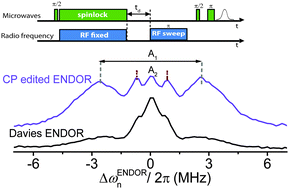Enhanced sensitivity of electron-nuclear double resonance (ENDOR) by cross polarisation and relaxation†
Abstract
Electron-nuclear double resonance (ENDOR) is a method of choice to detect magnetic nuclei in the coordination sphere of paramagnetic molecules, but its sensitivity substantially suffers from saturation effects. Recently we introduced a new pulsed ENDOR experiment based on electron-nuclear cross polarisation (CP) transfer. Here we analyse the time evolution of the spin polarization in CP-ENDOR and show that CP combined with inherent fast relaxation leads to enhanced sensitivity as compared to Davies ENDOR.


 Please wait while we load your content...
Please wait while we load your content...